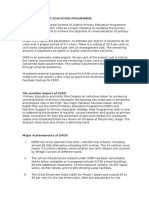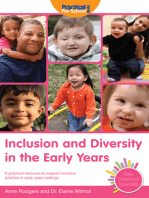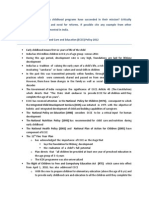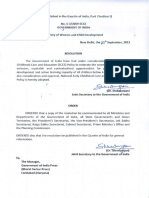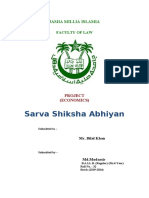National ECCE Policy Draft
National ECCE Policy Draft
Uploaded by
Rajasekhar GottimukkalaCopyright:
Available Formats
National ECCE Policy Draft
National ECCE Policy Draft
Uploaded by
Rajasekhar GottimukkalaOriginal Title
Copyright
Available Formats
Share this document
Did you find this document useful?
Is this content inappropriate?
Copyright:
Available Formats
National ECCE Policy Draft
National ECCE Policy Draft
Uploaded by
Rajasekhar GottimukkalaCopyright:
Available Formats
National Early Childhood Care and Education Policy
2012
DRAFT NATIONAL EARLY CHILDHOOD CARE AND EDUCATION (ECCE) POLICY
MINISTRY OF WOMEN AND CHILD DEVELOPMENT GOVERNMENT OF INDIA
1|Page
National Early Childhood Care and Education Policy
2012
Draft National Early Childhood Care and Education (ECCE) Policy
The National Early Childhood Care and Education (ECCE) Policy reaffirms the commitment of the Government of India to provide integrated services for holistic development of all children, along the continuum, from the prenatal period to six years of age. The Policy lays down the way forward for a comprehensive approach towards ensuring a sound foundation, with focus on early learning, for every Indian child.
2|Page
National Early Childhood Care and Education Policy
2012
Table of Contents
Section Title Page No. Section-1 Early Childhood Care and Preamble Education: The Context Social Context Policy Context Programme Context Section-2 Section-3 Section-4 ECCE Definition Policy Vision and Objectives Policy Focus Areas Universal Access with Inclusion Ensuring Quality with Equity Strengthening Capacity Monitoring Supervision Research, Evaluation and 9 and 4 4 4 5 6 6 7 8 8
Supportive 9
Documentation Advocacy Convergence and Coordination Section-5 Implementation 9 10
Institutional and Implementation 10 Arrangements Increased Investment Review 11 11
3|Page
National Early Childhood Care and Education Policy
2012
Draft National Early Childhood Care and Education (ECCE) Policy
1.
Preamble
1.1 Early childhood refers to the first six years of life. This is acknowledged as the most crucial period, when the rate of development is very high and foundations are laid for cumulative lifelong learning and human development. There is growing scientific evidence that the development of the brain in the early years is a pathway that affects physical and mental health, learning and behaviour throughout the life cycle. 1.2 India has 158.7 million children in the 0-6 years age group (Census 2011) 1.3 Early Childhood Care and Education (ECCE) is an indispensable foundation for lifelong learning and development, and has critical impact on success at the primary stage of education. It therefore becomes imperative to accord priority attention to ECCE and invest adequately by providing commensurate resources. 2. The Context
2.1 Social Context India has a tradition of valuing the early years of a childs life, and a rich heritage of practices for stimulating development and inculcating sanskaras or basic values and social skills in children. In the past this was transmitted primarily within families, through traditional child caring practices which were commonly shared and passed on from one generation to another. However, there have been changes in the family as well as social context in the last few decades. Besides, there is a globally emerging realization of the importance of the early years. 2.2 Policy Context 2.2.1The Government of India recognizes the significance of ECCE, which has been included as a constitutional provision through the amended Article 45 (The Constitution Act, 2002) which directs that The State shall endeavour to provide ECCE for all children until they complete the age of six years. 2.2.2 ECCE has received attention in the National Policy for Children (1974), consequent to which the Integrated Child Development Services (ICDS) was initiated on a pilot basis in 1975 with the objective of laying the foundation for holistic and integrated development of child and building capabilities of caregivers. The National Policy on Education (1986) considers ECCE to be a critical input for human development. The National Nutrition Policy (1993) has also recommended interventions for child care and nutrition during early childhood. The National Health Policy (2002) and National Plan of Action for Children (2005) have also been supportive policy initiatives for early childhood. The 11th Five Year Plan has acknowledged the importance of Early Childhood Care and Education (ECCE) as the stage that lays the foundation for lifelong development and the realisation of a childs full potential and directs that all children be provided at least one year of preschool education in the age group of 3-6
4|Page
National Early Childhood Care and Education Policy
2012
years. In the 11th Plan period, the ICDS programme was also universalized to cover all 14 lakh habitations.
2.2.3 The Right of Children to Free and Compulsory Education Act (RTE) which came into effect from April 1, 2010, has also addressed ECCE under Section 11 of the Act which states, with a view to prepare children above the age of three years for elementary education and to provide early childhood care and education for all children until they complete the age of six years, the appropriate Government may make necessary arrangement for providing free pre -school education for such children.
2.2.4 India is also a signatory to both the Convention on the Rights of the Child (CRC) 1989 and Education for All (EFA) 1990. The latter has postulated ECCE as the very first goal to be achieved for Education For All, since learning begins at birth. The Dakar Framework for Action (2000) and Moscow Framework for Action (2010) have reaffirmed the commitment to ECCE.
2.3 Programme Context 2.3.1 ECCE services are delivered through public, private and non-governmental channels. In the public sector, Integrated Child Development Services (ICDS) is the worlds largest programme imparting ECCE. Prior to the universalization of ICDS and its subsequent expansion, uncovered areas were attempted to be covered by preprimary system within the ambit of the primary school system. Programmes for universalizing elementary education such as the Sarva Shiksha Abhiyan (SSA) and National Programme for Education of Girls at Elementary Level (NPEGEL) have also supported setting up of ECCE centres, attached to primary schools in certain districts of the country. In addition, the Rajiv Gandhi National Crche Scheme for Working Mothers offers care and education services for children below 6 years of age. The private sector in an organised or unorganised form, with varied quality, is perhaps, the second largest service provider of ECCE, and its outreach is steadily percolating even into the rural areas across the country. In the voluntary sector, there are smaller scale initiatives. These are largely supported by trusts, societies, religious groups or international funding agencies. There is a need to harmonize the activities of all these service providers, in accordance with programme mandates, standards and legislations. 2.3.2 Despite existence of multiple service provisions, there is no reliable data available about the actual number of children attending ECCE provisions and their breakup as per delivery of services/ type of services. Of the 158.7 million children in the below six years category (Census 2011), about 75.7 million children i.e. 48 percent are reported to be covered under the ICDS (MWCD, 2011). Broad estimations indicate that a significant number is also covered by the private sector, besides some limited coverage by the NGO sector for which we have no data.
5|Page
National Early Childhood Care and Education Policy
2012
2.3.3 The quality of non formal preschool/ early childhood care and education imparted through these multiple channels is uneven, and varies from a minimalist approach to a mushrooming of accelerated academic programmes. This is largely an outcome of inadequate understanding of the concept of ECCE, its philosophy and importance among all stakeholders. This coupled with inadequate institutional capacity in the system and an absence of standards, regulatory norms and mechanisms as well as a lack of understanding of the basic premises of ECCE has aggravated the problem. In the above context, there is a need to ensure Early Childhood Care and Education (ECCE) for every child below six years across the country as a matter of government policy. This policy seeks to initiate reforms, measures and corrective actions.
3. The Policy Definition of ECCE: For the purpose of this Policy and the actions there under, Early Childhood Care and Education (ECCE) refers to programmes and provisions for children from prenatal to six years of age, which cater to needs of a child in all domains of development i.e. physical, motor, language, cognitive, socio- emotional, and creative and aesthetic appreciation; and ensure synergy with health and nutrition aspects. This would cover developmental priorities for each substage within the continuum, i.e. care, early stimulation/interaction needs for children below 3 years, and developmentally appropriate preschool education for 3 to 6 year olds with a more structured and planned school readiness component for 5 to 6 year olds. This policy is thus applicable to all early childhood care and education programmes/ related services in public, private and voluntary sectors in all settings across regions, that are offered to children under 6 years. These services could go by the nomenclature of Anganwadis (AWC), crches, play groups/schools, preschools, nursery schools, kindergartens, preparatory schools, balwadis, home based care etc. and propose to cater to the needs of children from prenatal to six years.
4. Vision of the Policy The Vision of the policy is to promote inclusive, equitable and contextualised opportunities for promoting optimal development and active learning capacity of all children below 6 years of age. It envisages to improve pathways for a successful and smooth transition from care and education provided at home to centre based ECCE and thereafter to school-age provision by facilitating an enabling environment through appropriate systems, processes and provisions across the country. In furtherance of the vision of the policy, the government shall be guided by the following objectives:
6|Page
National Early Childhood Care and Education Policy
2012
1.
Facilitating comprehensive childcare supports, infrastructure and services aimed at holistic well-being of children and responsive to their developmental needs. Ensure adaptive strategies for inclusion of all children. Build human resource capacity of ECCE across sectors to enhance and develop quality services for children and their families. Set out the quality, standards and curriculum framework for ECCE provisions and ensure their application and practice through advocacy and enforcement. Raise awareness and understanding about the significance of ECCE and promote strong partnerships with communities and families in order to improve the quality of life of young children through institutional, programmatic and technological means.
2. 3. 4. 5.
5.
The Policy The cardinal principles informing this policy are universal access, equity and quality in ECCE and strengthening capacity. These are considered interdependent and complementary to each other and integral to the programme of ECCE. There can be no access to ECCE, unless it is of an acceptable quality, affordable and is available to all.
5.1
Universal Access with Inclusion
5.1.1 The policy seeks to universalise the provision of ECCE for all children mainly through ICDS in public sector and other service provisions across systems. 5.1.2 Access would be through decentralized and contextualised approach, by expanding the current initiatives and also promoting and adopting innovative initiatives. 5.1.3 The ICDS Anganwadi Centre (AWC) would be repositioned as a vibrant child friendly ECD Centre with adequate infrastructure and resources for ensuring a continuum of ECCE in a life-cycle approach and child related outcomes. 5.1.4 Conversion of AWCs into AWCs-cum-crches with a planned early stimulation component and interactive environment for children below 3 years will be piloted. 5.1.5 Young children with different abilities would also be reached. Measures would require to be undertaken to ensure early detection and appropriate referrals with linkages for children at risk of developmental delays and disabilities. 5.1.6 Family based/ Community based and NGO based ECCE service delivery model would be experimented and promoted. 5.1.7 An urban strategy would be developed/ adopted to address the specific unmet needs of children in urban slums and to expand access to all urban settlements /slums etc. To facilitate this, rules pertaining to area/town planning may be amended in the 12 th Five Year Plan so as to provide space for neighbourhood AWCs.
7|Page
National Early Childhood Care and Education Policy
2012
5.1.8 To ensure universal access to integrated child development opportunities for all young children, the policy may support the option of ICDS complementing the private sector/voluntary sector programmes by extending its health and nutrition counselling and other facilities to enable provision of holistic ECCE for all young children. 5.1.9 Linkage with primary school system will be streamlined to address the issue of continuum and smooth transition from ECCE to primary schooling through school readiness package. 5.2 Ensuring Quality with Equity in ECCE Developmentally appropriate practices will be promoted through a multi pronged approach. 5.2.1 To standardize the quality of ECCE available to children, basic Quality Standards and Specifications will be laid down for ECCE which will be valid across public, private and voluntary sectors. 5.2.2 The current laissez faire situation in all sectors with regard to ECCE will not be allowed to continue. A Regulatory Framework for ECCE to ensure basic quality inputs and outcomes, across all service providers/ sectors undertaking such services, will be progressively developed/ evolved at the national level and shall be implemented by states, with appropriate customization, in the next five years. 5.2.3 A developmentally appropriate National Curriculum Framework for ECCE will be developed. It will promote play based, experiential and child friendly provision for early education and all round development. 5.2.4 The mother tongue or home language of the child will be the primary language of interaction in the ECCE programmes. However, given the young childs ability at this age to learn many languages, exposure to the national/ regional language and English in oral form as required, will also be explored. 5.2.5 The Government will endeavour to provide child friendly and developmentally appropriate play and learning materials. 5.2.6 Programme evaluation would be explored by adopting consistent assessment criteria and methodologies. 5.2.7 Formative and continuous child assessment would also be explored in order to ensure that the ECCE programme is responsive to the developmental needs of the child. 5.2.8 ICT potential will be optimally harnessed to promote all aspects of ECCE and particularly for monitoring, evaluation, capacity building and training. 5.3 Strengthening Capacity
5.3.1 Establishment of new and strengthening of existing institutions will be undertaken. Quality of ICDS and other related training institutes will also be upgraded.
8|Page
National Early Childhood Care and Education Policy
2012
5.3.2 Child Development Resource Centres will be established in NIPCCD Regional Centres with mandates for operating helpline; counselling centres; capacity development centres, assessment centres and advocacy hubs. 5.3.3 Mechanism will be established for professionalization of the ECCE service providers. A comprehensive training strategy will be developed and complementarity will be ensured between pre-service, in-service and on-site professional support. 5.3.4 The policy recognizes that the young children are best cared for in their family environment and thus strengthening family capabilities to care and protect the child will receive the highest priority. 5.3.5 A sound system for data collection/generation and information management will be established across the country with the use of information technology which will allow for regular collection, compilation and analysis of the data on ECCE. 6. 6.1 . Monitoring and Supportive Supervision Monitoring and supervision of ECCE programmes will be strengthened, based on a systematic Monitoring Framework with input, output and outcome indicators specified for ECCE quality, in tangible and measurable terms.
6.2 Consortiums of experienced NGOs, professionals and higher learning institutions will be identified at regional levels and invited to support government efforts in monitoring and capacity building for ECCE.
7.
Research, Evaluation and Documentation Research will be promoted to generate indigenous knowledge and to ensure a more evidence based approach towards planning, implementation and monitoring of ECCE programmes and interventions. Impact evaluation will be made integral to all interventions and action research will be promoted for generating innovative models.
8.
Advocacy A major deterrent to ensuring the right kind of ECCE is the lack of understanding of developmentally appropriate ECCE among the parents and other stakeholders. In order to address this deficit, extensive use of media will be made, including folk, print and electronic media, to reach out to parents, caregivers, professionals and the larger community and create awareness of the appropriate kind of ECCE. Parent and community outreach programmes will be strengthened to establish collaborative care providing relationships.
9.
Convergence and Coordination The policy envisages that the independently stated policies, programmes and other such related instruments, having bearing on ECCE, be smoothly interfaced with the
9|Page
National Early Childhood Care and Education Policy
2012
current policy. Regulatory, operational and financial convergence between these related schemes and programmes will be encouraged and achieved over a period. To emphasise the important role of parents/guardians, caregivers and for the long term sustainability of the appropriate early childhood care and education practices, a partnership approach between all stakeholders will be promoted and ensured. The institutional mechanism to ensure this would be the National and State ECCE Councils. 10 Institutional and Implementation Arrangements
10.1 The nodal Ministry for overseeing the ECCE programmes and services will be the MWCD along with its state level counterpart departments. All State Governments / UT Administrations would be advised to make ECCE a subject under Business Allocation Rules of Department of Women and Child Development, as has been made in Government of India under Ministry of Women and Child Development. Alternatively, there would be a clear delineation of formal elementary school system and non-formal pre-school system. 10.2 The policy envisages the establishment of an ECCE Cell / Division within MWCD as a nodal agency for interface, both at national and state levels, for inter-sectoral coordination. 10.3 To sustain the multi- sectoral and inter-agency collaboration, a thematic ECCE Committee, with experts/ advisors, jurists as members, would be formed under the ICDS Mission Steering Group initially and later formed as National ECCE Council, with corresponding councils at State and later at District level. The Council would be the apex body to guide and oversee the implementation of the National ECCE Policy as well as advise and guide ECCE programmes, consistent with the National ECCE Policy/ legislations etc. 10.4 Given that currently a significant number of 5 to 6 year olds are in primary schools in many states, and RTEs mandate being provision of free and compulsory elementary education from six years onwards, convergence with MHRD and State Departments of Education will be of key importance, particularly to adopt joyful learning approaches and extend the school readiness interventions for children of 5 plus years of age. Mechanisms will be instituted to facilitate this convergence so as to ensure continuity and inter-linkage, more so in the light of Section 11 of RTE. 10.5 Focus will be on decentralization. Provision will therefore be made for committees at the community, block, district, state and national levels. Parents, community members, District Assemblies, Regional Coordinating Councils, NGOs, Development Partners and the Government will be actively involved. 10. 6 The district level administrative units and the Panchayats will be strengthened to provide for more decentralised planning and implementation of ECCE programmes. Community based organisations such as Village Education Committees, Mothers (Parents) Committees, Village Resource Groups, PRIs will be directly involved and
10 | P a g e
National Early Childhood Care and Education Policy
2012
their capacities strengthened, to oversee the management of the ECCE centres across sectors. 10.7 The programme of action for implementing and complementing the National ECCE Policy, National Early Childhood Education Curriculum and Quality Standards for ECCE will be reflected in the National/ State Plan of Actions in SSA, ICDS APIPs, Crche Programme and any other similarly situated programme of national/state/ local bodies including PRIs. 10.8 The implementation strategy shall include creating an enabling environment for providing integrated services. 10.9 The policy also intends to develop a legal framework conducive to the implementation of the National Policy on ECCE, assuring the right of the child to holistic ECCE in the long run, after assessment of its being operationalised, and in subsequent plan. 11. Increased Investment towards Early Childhood Care and Education Evidence indicates highest rate of return on investments made in early years. The policy seeks to increase the aggregate spending on quality ECCE interventions through enhanced public spending on ECCE and through Public Private Partnership (PPP) mode. Finances will be provided in a commensurate manner to meet the demands arising from the above initiatives. Early Childhood (0-6 years) and ECCE budgeting would serve as an important dimension to assess investment in early years. The exercise of segregated child budgeting for early childhood may be carried out regularly so as to take stock of investments for children and to identify gaps in resource investment and utilization. This would also assess child related outcomes. 12. Review The implementation of the new policy will be reviewed every five years. Periodic appraisals will also be made to assess progress of implementation and make midcourse corrections, if and when required.
11 | P a g e
You might also like
- Edie 445 Case Study EdfdDocument11 pagesEdie 445 Case Study Edfdapi-4555972460% (1)
- Daycare Facility Business Plan - TemplateDocument4 pagesDaycare Facility Business Plan - TemplateIbrahim Babatunde Oladapo0% (1)
- PERFECT PHRASES For ESL Everyday SituationsDocument193 pagesPERFECT PHRASES For ESL Everyday SituationsGustavo Perea98% (41)
- Standards of ECCDDocument4 pagesStandards of ECCDdcgalarion394650% (2)
- Sarva Shiksha AbhiyanDocument19 pagesSarva Shiksha AbhiyanSwami Gurunand50% (2)
- Inclusion and Diversity in the Early Years: A practical resource to support inclusive practice in early years settingsFrom EverandInclusion and Diversity in the Early Years: A practical resource to support inclusive practice in early years settingsRating: 5 out of 5 stars5/5 (1)
- Intercultural DossierDocument16 pagesIntercultural DossierJennifer D.No ratings yet
- Infants and ToddlersDocument66 pagesInfants and ToddlersOana ChirilaNo ratings yet
- Factors Affecting Early Child DevelopmentDocument14 pagesFactors Affecting Early Child DevelopmentPat Vierneza-CalalangNo ratings yet
- WMELS OverviewDocument17 pagesWMELS Overviewkmfabich0% (1)
- Bem-Transforming The Debate On Sexual InequalityDocument7 pagesBem-Transforming The Debate On Sexual InequalityTristan_loverNo ratings yet
- National Early Childhood Care and Education Policy 2012Document5 pagesNational Early Childhood Care and Education Policy 2012amarsinha1987No ratings yet
- National Early Childhood Care and Education-ResolutionDocument26 pagesNational Early Childhood Care and Education-ResolutionVipul KumarNo ratings yet
- Early Childhood Education2Document15 pagesEarly Childhood Education2Sharanjeet SinghNo ratings yet
- Tracking The Progress of EFA Philippines - Goal 1 ECE - ECCDDocument20 pagesTracking The Progress of EFA Philippines - Goal 1 ECE - ECCDTiu Pasamonte AjmarieNo ratings yet
- Eced 21 Lesson2Document32 pagesEced 21 Lesson2Joanna Mae MendozaNo ratings yet
- Issues and Challenges of Implementation of Early Childhood Education in NigeriaDocument4 pagesIssues and Challenges of Implementation of Early Childhood Education in NigeriaJASH MATHEWNo ratings yet
- Analysis On Cost and Financing of Pre-School Education in NigeriaDocument9 pagesAnalysis On Cost and Financing of Pre-School Education in NigeriaOgunyinka, Emmanuel KayodeNo ratings yet
- Deped Inclusive EducationDocument7 pagesDeped Inclusive EducationJessamai Hernandez75% (4)
- PSFO Guide 2Document18 pagesPSFO Guide 2richagoel.272513No ratings yet
- Early Childhood & Elementry EducatioinDocument4 pagesEarly Childhood & Elementry EducatioinPreeti PanchagaviNo ratings yet
- Zim ActsDocument8 pagesZim ActshapanachavanozivaNo ratings yet
- Early Child Care and Education Attainment in Ethiopia: Current Status and ChallengesDocument7 pagesEarly Child Care and Education Attainment in Ethiopia: Current Status and ChallengesAbenezerNo ratings yet
- Policy Initiatives: The National Policy For Children Lays Down That The State Shall Provide AdequateDocument8 pagesPolicy Initiatives: The National Policy For Children Lays Down That The State Shall Provide AdequateRaghav DoomraNo ratings yet
- Paper 19 PDFDocument192 pagesPaper 19 PDFAnirbanNo ratings yet
- Sample ThesisDocument84 pagesSample ThesisMark Javie ParahiliNo ratings yet
- Early Childhood Development (ECD)Document11 pagesEarly Childhood Development (ECD)isenathimgqwetoNo ratings yet
- DEPED ORDER # 47 - Omnibus Policy On Kindergarten EducationDocument194 pagesDEPED ORDER # 47 - Omnibus Policy On Kindergarten EducationDivine Grace Samortin95% (21)
- Biñan City Development Center ProposalDocument8 pagesBiñan City Development Center ProposalArnel YambaoNo ratings yet
- The Status of Early Childhood Care and Development in BhutanDocument35 pagesThe Status of Early Childhood Care and Development in BhutanKarma ChimiNo ratings yet
- Inclusion of Children With DisabilitiesDocument2 pagesInclusion of Children With DisabilitiesZulfikar FahmiNo ratings yet
- 842 Resource Material-Early Childhood Care & Education XIDocument176 pages842 Resource Material-Early Childhood Care & Education XIiylesh100% (1)
- 04 D1 M1 S2 ECCD-Legal BasisDocument79 pages04 D1 M1 S2 ECCD-Legal BasisAbe AnshariNo ratings yet
- AEP - Teachers WorkbookDocument211 pagesAEP - Teachers Workbooksudharamalingam100% (1)
- Government of Meghalaya Department of EducationDocument46 pagesGovernment of Meghalaya Department of EducationrajeevdudiNo ratings yet
- Eco Project-2nd SemDocument22 pagesEco Project-2nd SemMirza Ahraz BaigNo ratings yet
- ICT PolicyDocument26 pagesICT PolicymeointechnologyNo ratings yet
- Ecce 2Document3 pagesEcce 2Chiranjibi Behera ChiruNo ratings yet
- Published Article VJESDocument12 pagesPublished Article VJESAlok SinghNo ratings yet
- Analysis of Factors Responsible For Poor Funding of Early Childhood Care and Education (ECCE) in Nigeria and Way ForwardDocument10 pagesAnalysis of Factors Responsible For Poor Funding of Early Childhood Care and Education (ECCE) in Nigeria and Way ForwardAcademic JournalNo ratings yet
- Sarva Shiksha Abhiyan: Jamia Millia IslamiaDocument16 pagesSarva Shiksha Abhiyan: Jamia Millia IslamiaMohammad ModassirNo ratings yet
- 2.0 Factors That Have Contributed To The Expansion of Early Childhood Education in KenyaDocument2 pages2.0 Factors That Have Contributed To The Expansion of Early Childhood Education in KenyaMadeleiGOOGYXNo ratings yet
- Oromiya School Classification Framework NewDocument16 pagesOromiya School Classification Framework Newgadaabilal7No ratings yet
- Child Welfare ProgrammesDocument8 pagesChild Welfare ProgrammesMohana RamasamyNo ratings yet
- Final ECDE Policy FrameworkDocument28 pagesFinal ECDE Policy Frameworkkuhulta afarNo ratings yet
- Visible Impact of Negligence in Early Childhood Care and Education On Indian Pre-SchoolsDocument5 pagesVisible Impact of Negligence in Early Childhood Care and Education On Indian Pre-SchoolsInternational Journal of Innovative Science and Research TechnologyNo ratings yet
- Comprehensive Sexuality EducationDocument18 pagesComprehensive Sexuality EducationNorma DoinogNo ratings yet
- India Childhood and CareDocument23 pagesIndia Childhood and CareVeeramani ManiNo ratings yet
- Individul AssignmentDocument18 pagesIndividul Assignmentwhite_partyNo ratings yet
- Sarva Shiksha BriefDocument4 pagesSarva Shiksha BriefMrLiquid05No ratings yet
- RRL How To Achieve Quality Early Childhood Education For All Goal 4 of The United Nations Sustainable DevelopmentDocument10 pagesRRL How To Achieve Quality Early Childhood Education For All Goal 4 of The United Nations Sustainable DevelopmentKim KangNo ratings yet
- Ethics and ProfessionalismDocument9 pagesEthics and ProfessionalismBanda BrianNo ratings yet
- Best Materials of EcceDocument48 pagesBest Materials of EcceSai smitaNo ratings yet
- India On The Way To Global Movement On Quality ECCEDocument7 pagesIndia On The Way To Global Movement On Quality ECCEMazlinaNo ratings yet
- Increasing Quality of and Access To Early Childhood Education (ECE) Services-OISDocument13 pagesIncreasing Quality of and Access To Early Childhood Education (ECE) Services-OISsexxytonyNo ratings yet
- Comprehensive Sexuality EducationDocument4 pagesComprehensive Sexuality Educationmedelyn trinidadNo ratings yet
- Veena Article - 1 Kiran SoniDocument12 pagesVeena Article - 1 Kiran SoniINTERNATIONAL JOURNAL FOR EDUCATIONAL RESEARCH STUDIESNo ratings yet
- Early Childhood Education and Sustainable Development Goals: AssignmentDocument4 pagesEarly Childhood Education and Sustainable Development Goals: AssignmentJessieNo ratings yet
- ECE Workforce MsiaDocument28 pagesECE Workforce MsiachsleongNo ratings yet
- National Education Policy 2020: Potential Differences in Public vs. Private Center-Based Early Childhood Care and Education in IndiaDocument7 pagesNational Education Policy 2020: Potential Differences in Public vs. Private Center-Based Early Childhood Care and Education in IndiaInternational Journal of Innovative Science and Research TechnologyNo ratings yet
- Child WelfareDocument20 pagesChild Welfarearp_patel88No ratings yet
- text 5Document57 pagestext 5achalsachdev30No ratings yet
- Study of Aims & Main Features of Sarva Shiksha Abhiyan (Ssa) & Its Importance in EducationDocument5 pagesStudy of Aims & Main Features of Sarva Shiksha Abhiyan (Ssa) & Its Importance in EducationAnonymous CwJeBCAXpNo ratings yet
- Assignment On Legal Early Childhood Education in Nigeria Submitted by SarahDocument5 pagesAssignment On Legal Early Childhood Education in Nigeria Submitted by Sarahemmzydegreat01No ratings yet
- Elcc Strategy 2030Document28 pagesElcc Strategy 2030Jimena Andrea Sanhueza MartinezNo ratings yet
- Impact Assessment Report-Strengthening of Bal Vikas Kendra in Jamshedpur-March-2014Document32 pagesImpact Assessment Report-Strengthening of Bal Vikas Kendra in Jamshedpur-March-2014Nawaz Ul HaqueNo ratings yet
- Children's Development Birth - 12 Years Text Book ExtractDocument72 pagesChildren's Development Birth - 12 Years Text Book ExtractDoodah2100% (1)
- Sandras ResumeDocument4 pagesSandras Resumeapi-317053658No ratings yet
- 1.workye TsigeDocument83 pages1.workye TsigeAlex WorkinaNo ratings yet
- The Effect of Father Involvement in Childcare On The Psychological Well-Being of Adolescents: A Cross-Cultural StudyDocument14 pagesThe Effect of Father Involvement in Childcare On The Psychological Well-Being of Adolescents: A Cross-Cultural StudyliviaNo ratings yet
- 10 + 1 2Document58 pages10 + 1 2limseol777No ratings yet
- Fathers On Leave - Experiences of Middle-Class Fathers On Parental Leave in The City of ZagrebDocument23 pagesFathers On Leave - Experiences of Middle-Class Fathers On Parental Leave in The City of Zagreblanamarijanovic.lmNo ratings yet
- Taryn Tarr-Wolfla Resume 1-1Document2 pagesTaryn Tarr-Wolfla Resume 1-1api-264569989No ratings yet
- ApprovalDocument4 pagesApprovalbigboy6669000No ratings yet
- Child Welfare and OverindulgenceDocument10 pagesChild Welfare and OverindulgenceNISHITA SRIVASTAVA 19224127No ratings yet
- Balancing Motherhood and Education Research ProposalDocument105 pagesBalancing Motherhood and Education Research ProposalHeather Shipley0% (1)
- Brgy. Salvacion Gad Plan 2022 (Final)Document8 pagesBrgy. Salvacion Gad Plan 2022 (Final)Janusz SavillagaNo ratings yet
- ZerotoThree Guidelines PDFDocument34 pagesZerotoThree Guidelines PDFwolfdare11No ratings yet
- 德国 2008GETTING AHEAD THROUGH EDUCATION. The Qualification Initiative for GermanyDocument20 pages德国 2008GETTING AHEAD THROUGH EDUCATION. The Qualification Initiative for Germanyjanuary20230908No ratings yet
- City of Los Angeles Aids Coordinator'S Office 2010 Aids Prevention Research Request For ProposalsDocument79 pagesCity of Los Angeles Aids Coordinator'S Office 2010 Aids Prevention Research Request For Proposalsapi-26601760No ratings yet
- National Creche Scheme For The Children of Working Mothers - 0Document30 pagesNational Creche Scheme For The Children of Working Mothers - 0Arjun PrasadNo ratings yet
- HPS Bi-Fold Prospectus SelectedDocument2 pagesHPS Bi-Fold Prospectus Selectedfreebees.adsNo ratings yet
- 家庭的重要性Document7 pages家庭的重要性jewypiv0gid3No ratings yet
- Editorial: Early Prevention and Intervention - The Five W (And One H) QuestionsDocument3 pagesEditorial: Early Prevention and Intervention - The Five W (And One H) QuestionsArwenNo ratings yet
- Keyworking in Residential Child Care - Lessons From ResearchDocument8 pagesKeyworking in Residential Child Care - Lessons From ResearchjavieraNo ratings yet
- Pride Training Flyer.09.2012Document1 pagePride Training Flyer.09.2012ConnellyEastNo ratings yet
- Details of Prenu - in Charges - Bangalore - 2021Document3 pagesDetails of Prenu - in Charges - Bangalore - 2021lokelooksNo ratings yet
- Infant Weight Loss GuideDocument1 pageInfant Weight Loss GuideCoryNo ratings yet
- City Limits Magazine, October 1982 IssueDocument36 pagesCity Limits Magazine, October 1982 IssueCity Limits (New York)No ratings yet




